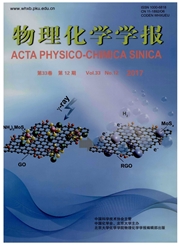

 中文摘要:
中文摘要:
光电催化分解水系统能直接将收集的电子与空穴用于分解水,将太阳能转化成了具有高能量密度的氢气,是一种集太阳能转化和储存于一体的高效绿色能源系统。光阴极和光阳极串联要求其在工作状态下两电极通过的总电流必须一致,低效率的一端将会限制整个体系的反应速度,因此对于光阳极材料的系统研究具有十分重要的意义。理论预测表明,基于部分可见光响应的半导体光阳极能带间隙计算得到的极限太阳能制氢转化效率达到了15%。但实际上由于光催化的整个过程是一个多步反应,各个步骤上发生的光生载流子的复合和损失导致了目前合成的相关电极材料的转换效率远低于理论水平。一般可以认为光催化过程包括五个步骤:光电极材料中电子的光致激发而产生电子-空穴对、电子和空穴由于能带弯曲的反向分离和传递、电子(或空穴)通过半导体-电解液界面的注入水中析氢(或析氧)、载流子的复合以及反应物和产物的传质过程。由于这些过程的进行效率与电极材料的本质特性和性能密切相关,为了评估材料性能而引入的一些效率指标往往和这几个步骤相对应。本文首先简要介绍了评价光阳极的一些效率计算以及它们与上述各个步骤的内在联系。最后,在前人和最近的研究基础上总结了几种对光阳极材料的主要提升策略,包括形貌控制、元素掺杂、异(同)质结和表面修饰等改性方法,对这些改性方法和各步骤效率之间的联系作了简单的介绍。
 英文摘要:
英文摘要:
Photoelectrochemical water splitting is to utilize collected photo-generated carrier for direct water cleavage for hydrogen production. It is a system combining photoconversion and energy storage since converted solar energy is stored as high energy-density hydrogen gas. According to intrinsic properties and band bending situation of a photoelectrode, hydrogen tends to be released at photocathode while oxygen at photoanode. In a tandem photoelectrochemical chemical cell, current passing through one electrode must equals that through another and electrode with lower conversion rate will limit efficiency of the whole device. Therefore, it is also of research interest to look into the common strategies for enhancing the conversion rate at photoanode. Although up to 15% of solar-to-hydrogen efficiency can be estimated according to some semiconductor for solar assisted water splitting, practical conversion ability of state-of-the-art photoanode has yet to approach that theoretical limit. Five major steps happen in a full water splitting reaction at a semiconductor surface: light harvesting with electron excitations, separated electron-hole pairs transferring to two opposite ends due to band bending, electron/hole injection through semiconductor-electrolyte interface into water, recombination process and mass transfer of products/reactants. They are closely related to different proposed parameters for solar water splitting evaluation and this review will first help to give a fast glance at those evaluation parameters and then summarize on several major adopted strategies towards high-efficiency oxygen evolution at photoanode surface. Those strategies and thereby optimized evaluation parameter are shown, in order to disclose the importance of modifying different steps for a photoanode with enhanced output.
 同期刊论文项目
同期刊论文项目
 同项目期刊论文
同项目期刊论文
 期刊信息
期刊信息
